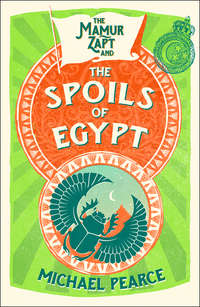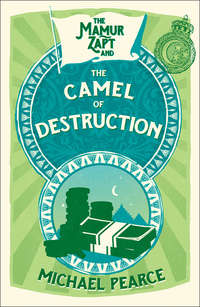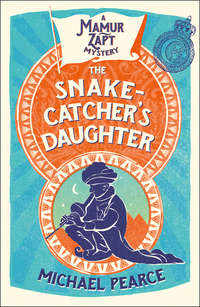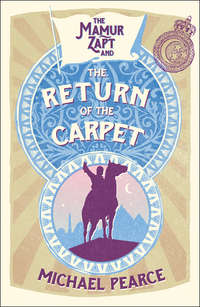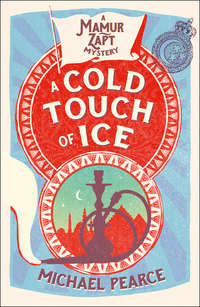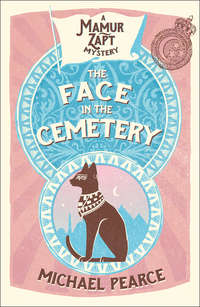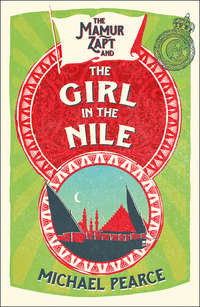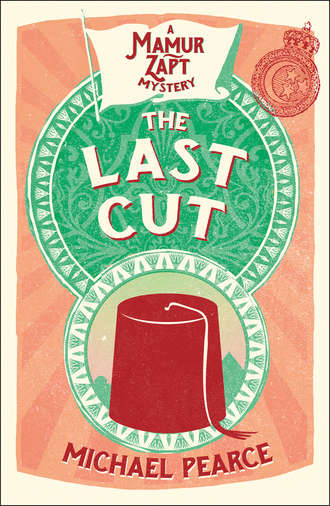
Полная версия
The Last Cut

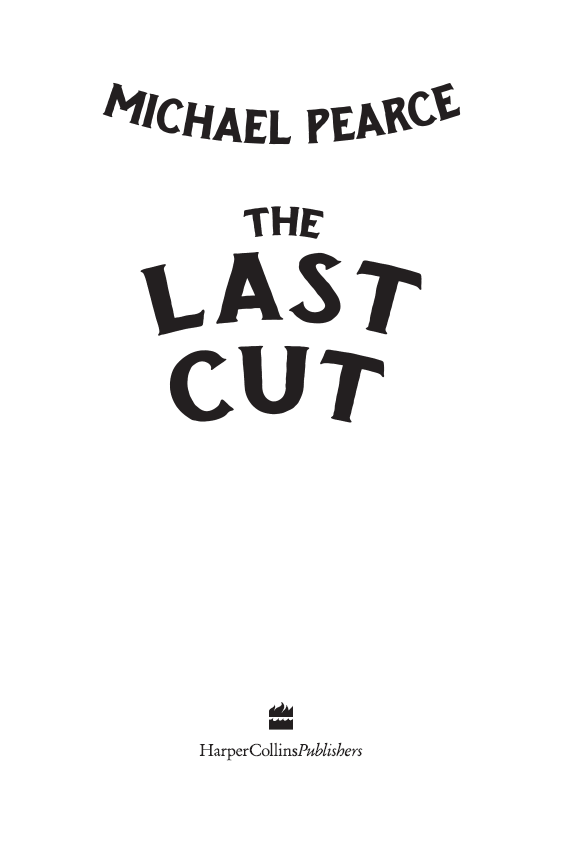

HarperCollinsPublishers Ltd. 1 London Bridge Street London SE1 9GF
www.harpercollins.co.uk
First published in Great Britain by HarperCollinsPublishers 1998
Copyright © Michael Pearce 1998
Michael Pearce asserts the moral right to be identified as the author of this work
This novel is entirely a work of fiction. The names, characters
and incidents portrayed in it are the work of the author’s imagination.
Any resemblance to actual persons, living or dead, events or localities is entirely coincidental.
All rights reserved under International and Pan-American Copyright Conventions. By payment of the required fees, you have been granted the nonexclusive, nontransferable right to access and read the text of this ebook onscreen. No part of this text may be reproduced, transmitted, downloaded, decompiled, reverse engineered, or stored in or introduced into any information storage and retrieval system, in any form or by any means, whether electronic or mechanical, now known or hereinafter invented, without the express written permission of HarperCollins ebooks
HarperCollinsPublishers has made every reasonable effort to ensure that any picture content and written content in this ebook has been included or removed in accordance with the contractual and technological constraints in operation at the time of publication
Source ISBN: 9780008259495
Ebook Edition © JULY 2012 ISBN: 9780007400300
Version: 2017-09-05
Praise for Michael Pearce
‘This series continues to be the most delightful in current detective fiction’
Gerald Kaufman, Scotsman
‘Pearce … takes apart ancient history and reassembles it with beguiling wit and colour’
Sunday Times
‘Irresistible fun’
Time Out
‘The Mamur Zapt’s sly, irreverent humour continues to refresh the parts others seldom reach’
Observer
Contents
Title Page
Copyright
Praise for Michael Pearce
1
2
3
4
5
6
7
8
9
10
11
12
13
Keep Reading
About the Author
Also by
About the Publisher
1
‘It will be for the last time,’ said Garvin, the Commandant of Police.
‘It seems a pity,’ said the Kadi’s representative, ‘after a thousand years.’
‘Oh, more than that,’ said McPhee, the Deputy Commandant. ‘The rites almost certainly antedate the Arab invasion. The ancient Egyptians –’
‘Yes, well, thank you,’ said Garvin. ‘That all?’
‘There’s the question of the gravediggers,’ said the young man from the Consulate.
‘Gravediggers?’
‘Yes. The ones who actually make the cut. It’s either the Muslim gravediggers or the Jews. This year it’s the Jews.’
‘Well, then –’
‘Yes, but it falls on their Sabbath this year.’
‘Okay, let the Muslim gravediggers do it, then.’
‘They won’t like that!’
‘The Muslims?’
‘No, the Jews. It’s their turn.’
‘Yes, but they won’t do it on the Sabbath, I thought you said?’
‘Well, they will do it if they’re told to. And if they get paid extra.’
There was a little silence.
‘I suppose I could get the Old Man to talk to the Finance Department.’
‘And I could get the Kadi to talk to the Khedive and get him to tell them.’
‘That all settled, then? Nothing else?’ asked Garvin. ‘Right, Mamur Zapt, the rest is up to you.’
As they got up from the table, McPhee said:
‘They used to sacrifice a maiden, you know.’
‘Nonsense!’ said the Kadi’s representative. ‘That’s just a myth. Anyway, it was the Christians.’
‘That’s a myth, too,’ said the representative of the Copts hastily. ‘You can’t blame it on us. The Canal wasn’t built till the Arabs came.’
‘The rite may be older,’ said McPhee. ‘It almost certainly dates back to the Pharaohs.’
‘Let’s blame them, then,’ said the young man from the Consulate, picking up his papers. ‘At least they can’t answer back.’
‘That’s all in the past, anyway,’ said Garvin. ‘These days we’ve got other things to think about.’
‘What other things?’ asked Owen. It was the first time he’d done this.
‘Oh, the general disorder. People use it as an excuse –’
‘They certainly do,’ said McPhee, cheeks going pink.
‘To do what?’
‘Well …’
‘The women go unveiled, that sort of thing,’ said the Kadi’s representative.
‘Worse than that,’ said McPhee primly.
‘Really?’ said Owen. ‘Exactly what –?’
‘You’ll find out,’ said Garvin. ‘At any rate, it will be for the last time.’
‘Watch out for the Maiden,’ said the young man from the Consulate, as he and Owen left the room together.
They found her, of course, the next day.
The canal bed, awaiting the water, was dry now throughout most of its insalubrious length. It ran through the heart of the city from Old Cairo to the new barracks at Abbasiya and was a handy dumping-place for rubbish of all kinds, from excrement to onion peelings to collapsed angarib rope-beds to dead dogs; and, of course, to dead humans. It had the additional advantage in the last case that towards the time of the Inundation it had become so foul as to deter all but the lowest scavengers from venturing into it. The maiden would have gone undiscovered had it not been for the fact that the ceremonial cutting of the dam involved the construction of a tall cone of earth, and it was while the workmen had been working on this that they had come upon the body.
Bodies deteriorated quickly in the heat and it was by no means evident now that the body was that of a maiden, but the workmen were in no doubt. Nor, unfortunately, was the rest of the population of Cairo.
‘Blast it!’ said Garvin. ‘They’ll all connect it with ending the Cut!’
Every year when the waters of the Nile began to rise, a temporary dam was constructed across the mouth of the Khalig Canal, just opposite Roda Island. When the Nilometer on the Island showed that the water was at its highest, the dam was cut and the water allowed to flow through the canal. The moment traditionally marked the release of waters throughout the land, when the dams would be opened and the water pour into the canals and through the irrigation system as a whole.
After this year the water would still pour but the Cut would be no more. The canal was to be filled in and a tramway put on top of it.
All the Departments were pleased: Sanitation, because the canal was a notorious health hazard, Transport, because they got a new tramway out of it. Finance, because they got it at a cost of next to nothing, Irrigation, because the damned thing was an irrelevance anyway, the Government generally because it could be seen as modernization.
The ordinary Cairene, however, who had always had great affection for the festivities which accompanied the Cut, was much less happy.
‘The British are taking away all our pleasures,’ they grumbled.
In most countries they would have blamed the Government. In Egypt they blamed the British. This was reasonable since the British ran the country. Invited in by a former Khedive to assist him to straighten out the country’s finances, they had decided to assist him to straighten out a few other things as well, and were still, thirty years later, assisting.
‘Another example of the British killjoy spirit!’ thundered the popular (Arab) press. ‘First, they ban the Hoseini celebrations –’
‘But that was because they were mutilating each other!’ protested Owen.
It had been the practice, as part of the general festivity, for dervishes to slash each other with swords, scourge their backs with razor-like chains, and impale themselves, and their neighbours, on meat-hooks.
‘Surely you don’t defend –’ he had said to his friend, Mahmoud.
Mahmoud, a young lawyer in the Ministry of Justice, was the last person to defend such practices. He regarded them as a thing of the past and the past was exactly what he wanted to get rid of. Like most of the Ministry lawyers, he was a member of the Nationalist Party and committed to modernization. For that reason he wasn’t much in favour of the canal, either.
‘It’s an open sewer,’ he said.
Nevertheless, he felt sorry about the ending of the Cut.
If even he, arch-modernizer that he was, felt a twinge over the Cut’s going, then Owen could just imagine how the ordinary inhabitants of the city felt. The Cut was part of popular history. Removing it was like removing a part of oneself, a tooth, say, yes, a wisdom tooth, useless but painful to extract. Not only that; some people believed in the wisdom. They might resist its going.
That was why this time Owen had become involved. Ordinarily, marshalling the festivity was a matter of simple policing and Owen preferred to leave simple policing to the simple police. The Mamur Zapt, Head of what had in the past been known as the Khedive’s Secret Police and what was today very properly thought of, in English terms, as the Political Branch, had a more discreet responsibility for preserving law and order. The Khedive liked to say that the Mamur Zapt was the hidden hand that held the city. Rather too often he saw the hand as a fist; whereas Owen preferred to keep it hidden.
What concerned him now was that whereas in any normal city the ending of the Cut would be merely a matter for mutter, in the explosive mixture of races and religions that was Cairo it could very quickly and all too easily ignite into violence. And the Maiden was just the thing that could provide the spark.
About the Maiden as maiden, Owen, as Mamur Zapt, cared nothing at all. Ordinary murder was not his concern. But about the Maiden as a possible source of political conflagration he cared a great deal. Even if she was a myth.
Which was why he decided to take an interest in the case. He rang up the Parquet to ask who was handling it.
‘El Zaki,’ they said.
This was fortunate, for El Zaki was Owen’s friend, Mahmoud.
‘Where is he?’ he asked.
‘At the mortuary.’
This was fortunate, too, as the mortuary was the only cool place in Cairo. He went there with speed, or, at least, in an arabeah, the horse-drawn cab which at that time in Cairo served as taxi. Unsurprisingly, this being August, when men, flowers and horses drooped, by the time he got there Mahmoud was coming out.
‘Do they serve coffee in there?’
‘Yes, but it smells of formaldehyde.’
They went instead to a café round the corner. It was an Arab café and, as in most Arab cafés, the main room was underground, where darkness provided relief from the sun.
‘So they’ve put you on this?’
‘Yes,’ said Mahmoud ruefully. ‘You can’t win them all.’
‘I’d like to take an interest.’
‘No one else is,’ said Mahmoud sourly. ‘Not at the Parquet, at any rate.’
The Parquet was the Department of Prosecutions at the Ministry of Justice, to which Mahmoud belonged. In Egypt criminal investigation was not the responsibility of the police. Their task was merely to notify the Parquet that a crime had been committed. Once that had been done, responsibility for conducting the investigation was, as in the French system on which the Egyptian system was based, with the lawyer the Parquet assigned to the case.
‘I hope you’re right about that.’
He told Mahmoud of his fears. Mahmoud dismissed them.
‘The body could have been dumped anywhere,’ he said.
‘Yes. I know. But people are making a connection with the Cut.’
Mahmoud had little time for myths and none at all for the Myth of the Maiden.
‘Superstitious nonsense,’ he said. ‘We’re not still in the Dark Age, you know.’
Owen thought that some Egyptians, the ones he was worried about, might be dragging their feet. He wisely kept silent, however. Mahmoud was inclined to be touchy about remarks which he considered reflected upon Egypt.
‘What does the autopsy show?’ he asked.
‘The report’s not ready yet. It’s taking a while because of the condition of the body. There is some evidence of deterioration through water. If that turns out to be true, it would help us to establish when the body was dumped. There was still water in the Canal. That would put it in March or April.’
‘Or later,’ said Owen. ‘Even when most of it’s dry, there are still stagnant pools. Have you established the cause of death?’
‘Impossible to tell yet. Some evidence of wounding to the lower abdominal region. But that could just have been dogs.’
‘No evidence of, well, wounding of a ritual nature?’
‘I don’t know what that would be,’ said Mahmoud coldly. ‘We don’t have ritual killings in Cairo. Now, if we were some obscure tribe down in the Sudan –’
‘All right, all right. I don’t know what it would be, either. But if we could rule it out publicly, that might help to dispel the myth –’
‘She could have died of old age for all we can tell at the moment,’ said Mahmoud. ‘And it’s about time the Myth of the Maiden did.’
Owen, wisely, let the matter drop.
‘Failed?’ said the engineer from the Irrigation Department. ‘Our regulators don’t fail!’
‘Regulator?’ said Owen. ‘What’s a regulator?’
‘You don’t know what a regulator is! It’s a – well –’
‘It’s like a gate,’ said the Under-Secretary, to whose office Owen had been frantically summoned. ‘A gate in a dam. It controls the flow of water through the dam.’
‘And it’s failed? Well, I’m sorry about that. But, look, it all sounds very technical to me. I don’t quite see why I’ve been –’
‘It’s not failed!’ cried the engineer in exasperation. ‘That’s what I keep trying to say! It’s been sabotaged!’
The Manufiyah Regulator was one of the huge series of works which together formed the Delta Barrage. The barrage was built across the Nile about fifteen miles north of Cairo just where the river divided into two great arms which continued independently to the Mediterranean, coming out at Rosetta and Damietta. It controlled the supply of water to the whole of Lower Egypt but in particular to the immensely fertile region that lay between the arms. It distributed the water through a number of canals, the flow in each of which was determined by a separate regulator. The Manufiyah Regulator was one of the most important of these.
‘Important?’ said the Under-Secretary, who was travelling with them in the Irrigation Department’s launch. ‘You’d think so if you were a farmer in the Middle Delta!’
Owen could see the barrage now, rising up ahead of them. It was like a long castellated wall, with minarets in the centre and a campanile at each end. As it came closer, he could make out the arches, a hundred and thirty of them altogether, the engineer said. He looked for the damage.
‘No, no!’ said the engineer impatiently. ‘Not there! Behind! Regulator. Canal. See?’
That was exactly what Owen didn’t see. What he did see, suddenly, away to his right, was a vision of palms and water: palms jutting up from the water as from tiny islands in a sea; men walking between the islands apparently on the surface of the water but actually on little earth walls; buffaloes forging contentedly through the shallows but every now and then, surprised, dropping suddenly and having to swim, with their great noses held up high out of the water; flat, punt-like boats poled along by a man, often with a little boy in the stern, holding an animal, a calf or a goat, by the front hooves as it splashed behind, exactly as in the ancient friezes.
The vision shimmered and he knew that it wasn’t there really, or, rather, that it was not there but somewhere else, not there in the desert where he was looking but somewhere else, down river, where the water had already spread over the fields.
He turned to the engineer.
‘You’ve already released it, then?’
‘Some of it. It seemed best, with one of the regulators going. But we would have released it anyway.’
‘Without waiting for the Cut?’
‘Cut? What’s that? Oh, I know, the Khalig Canal and all that stuff. No, that’s all in the past. We don’t wait for that nowadays. No, it’s nothing to do with us.’
The single long wall of the barrage was in a sense illusory. There were, in fact, two separate barrages, one across the Damietta arm of the Nile, the other across the Rosetta arm. Each barrage was about five hundred metres long and they were linked by a revetment wall which ran for a thousand metres over the triangle of ground between the arms. The triangle had been made into spectacular gardens which were a great draw to the city’s inhabitants at weekends and on festival days.
Today, of course, there was an even greater draw and the Gardens on the Rosetta side were a solid mass of people. Policemen had to force a way through for the Minister and his party.
They were also trying, rather less successfully, to clear a passage for a long line of carts piled high with rubble, stretching now right across the Gardens. As each cart came up to the damaged regulator, it was turned and then backed up on to the embankment which led to the small service road running across the top of the regulator gates. It was then edged along the road until it reached the gap, where it would discharge its load in a great crash of stone and spray.
It was the turning of the carts that was the problem. The people were wedged in so tightly at that point that the carts could hardly make inroads. The drivers lost patience and laid about them with their whips, the constables with their batons. The crowd did not, could not budge.
‘Clear the bloody lot out of the way!’ shouted a furious voice from down at the foot of the regulator somewhere.
Constables, carts, workmen and sympathetic onlookers hurled themselves at the crowd. It gave a yard or two. Some small boys fell into the river. Other onlookers were forced on to the flower beds.
‘My beds! My beds!’ cried an anguished voice.
A stocky little man, galabeeyah skirts hitched up round his knees, skull cap askew on his head, rushed across desperately.
‘Have you no thought? Have you no sense? Have you no feeling?’
He hammered on the sides of a cart with his fists.
The driver, face running with sweat, glanced down.
‘Abdullah, there are more important things in life just now than bougainvillea!’
He struck the horse a mighty blow with his whip. It shot forward; across a rose-bed and into a clump of datura, where it stuck. The heavy white blossoms closed over its flanks like ornamental wreaths.
‘I shall kill it!’ cried the gardener wildly, seizing a spade.
Concerned onlookers seized him.
‘But, Abdullah,’ one of them remonstrated, ‘the water is important –’
The gardener stopped his struggling. ‘Water?’ he said. ‘Do you think you need to tell me about water? Me? How do you think all this grows, then? What do you think I –?’
Owen moved away. If there was one thing any Egyptian was guaranteed to have a view on, it was water.
Which made it all the more extraordinary that –
The Ministerial party had at last reached the regulator. Down at its foot, some in the water, some out, men were working frantically. Among them was a European in a helmet. He looked up, then scrambled up to meet them.
‘Hello, Minister! Glad to see you!’
‘How are you getting on?’
The helmeted man shrugged.
‘At the moment we’re just trying to get it under control,’ he said.
‘Any idea of the extent of the damage?’
‘One of the gates has gone.’
He pointed to the regulator. The gates had been forced open. One of them bent back at an angle.
‘It got the full force of the blast.’
‘It definitely was a blast, was it?’ asked Owen.
The man looked at him.
‘Owen, is it? The Mamur Zapt? Seen you at the Club, but not spoken. Glad to meet you.’ They shook hands. ‘Yes, it definitely was. I can show you. Not just this moment, though. I’ve got things I must –’
He glanced back at the regulator.
‘No, that’s fine. Look, I won’t take your time. Can you put me on to someone else? Anyone see anything? Presumably you yourself weren’t –’
‘I was in bed. It was two o’clock in the morning.’
‘Someone called you. Who was that?’
‘The watchman. Ahmed.’
‘Can I have a word with him? Where would I find him?’
The engineer pointed up to the main wall of the barrage.
‘He’s up there,’ he said. ‘Ask for Ahmed.’
The watchman’s hut was empty except for a woman with a baby and a small boy. When Owen asked for Ahmed, she nodded and sent the boy to fetch him. Meanwhile, Owen walked out on to the barrage.
Upstream, feluccas were tacking gracefully in the wind and, closer to, a large gyassa, sails newly lowered and rigging bright with the little scarlet flags used for marriages and the return of pilgrims from Mecca, was disgorging passengers on to the shore. They were already beginning to make their way up to the gardens, past a long line of stalls selling peanuts and pastries and sweetmeats and souvenirs. In the gardens there were yet more stalls, tucked among the bamboo thickets and the prickly pears, the clumps of datura and the bright masses of bougainvillea.
Everywhere, too, there were water-sellers. It was a hot day and their services were much in demand; so much so that there was a steady file of them going back to the river to replenish their water-skins. Down by the gyassa he could see their black bags floating on the water.
The boy returned with an old, grey-haired man; not too old, apparently, for both the boy and the baby were his.
‘Pardon my slowness, Effendi.’
‘Even the Khedive should wait for age,’ said Owen courteously.
‘Ah, it’s not age,’ said the man, tapping his leg. ‘It’s this. I broke it when we were building the Dam at Aswan. It set badly and they said I could not work again. But when Macrae Effendi came up here he sent for me and made me watchman.’
‘And you were watching last night?’
‘That is so.’
‘And what did you see?’
The man hesitated.
‘Well, Effendi, it was not what I saw. It was – I was out on the bridge. And then the air hissed suddenly across my face and at once there was a mighty clap, as of thunder. And I said: “That cannot be right, for no one does that sort of work at night.” For I knew what it was, having worked on the Dam at Aswan. And then I heard the rush of water, and saw the whiteness in the darkness, and knew the dam had broken. And I hastened back and sounded the signal and called Macrae Effendi.’
‘You did well.’
‘And then I went back on to the bridge. Effendi, I know I could have gone to the breach. But with this –’ he motioned towards his leg–‘what could I have done? And, besides, Macrae Effendi says: “Let every man do his duty. If every man does his duty, then all will be well.” And my duty, Effendi, was on the bridge.’
‘Quite right. So there you were, back on the bridge, watching, as was your duty. What else did you see?’


